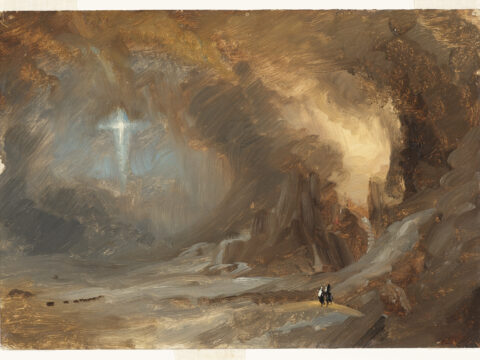
We can therefore have no greater evidence of a change in us from this state and condition, than a change wrought in the course of our thoughts.
And the more the stream of our thoughts is turned, the more our minds are filled by those of a contrary nature, the greater and firmer is our evidence of a translation out of that depraved state and condition.
There is nothing so unaccountable as the multiplicity of thoughts of the minds of men. They fall from them like the leaves of trees when they are shaken by the wind in autumn. To have all these thoughts, all the several figments of the heart, all the conceptions that are framed and agitated in the mind, to be evil, and that continually — what a hell of horror and confusion that must be! A deliverance from this loathsome, hateful state is more to be valued than the whole world. Without it, neither life, nor peace, nor immortality, nor glory, can ever be attained.
The minds and hearts of men are continually minting and coining new thoughts and imaginations; the cogitative faculty is always at work. As the streams of a mighty river running into the ocean, so are the thoughts of a natural man, and through self, they run into hell. It is a silly thing to set a dam before such a river, to try to curb its streams. It may be stopped for a little while, but it will quickly break down all obstacles, or overflow all its bounds. There is no way to divert its course except by providing other channels for its waters, and turning it into them. The mighty stream of the evil thoughts of men will allow no bounds or dams to put a stop to them. There are but two ways of relief from them — the one respecting their moral evil, the other their natural abundance. The first is by throwing salt into the spring, as Elisha cured the waters of Jericho (2Kng 2.21) — that is, to get the heart and mind seasoned with grace; for the tree must be made good before the fruit will be good. The other is to turn their streams into new channels, putting new aims and ends upon them, fixing them on new objects. So shall we abound in spiritual thoughts; for abound in thoughts we shall, whether we would or not.
This is why, when we are spiritually minded, we abound in spiritual thoughts, or thoughts of spiritual things. That we merely have such thoughts will not sufficiently evidence that we are so, unless we abound in them. And this leads us to the principal inquiry on this topic: namely, what measure we should assign to this, that we may know when we abound in spiritual thoughts, so that they may be an evidence of our being spiritually minded.
I answer generally, among other Scriptures, read over Psalm 119 with understanding. Consider what David expresses about himself in it, as to his constant delight in and continual thoughts of the law of God, which was the only means of divine revelation in that season. Test yourselves by that pattern; examine yourselves, whether you can truly speak the same words he did — if not in the same degree of zeal, at least with the same sincerity of grace. You may say, “That was David. It is not for us; it is not our duty to be like him, at least not to be equal with him.” But as far as I know, we must be like him, if we ever intend to come to the place where he is. It will ruin our souls, if when we read in the Scripture how the saints of God expressed their experience in faith, love, delight in God, and constant meditation on him, we then grant that it was so with them — that they were good and holy men — but it is not necessary that it be so with us. These things are not written in the Scripture to show what they were, but what we ought to be. All things concerning them were “written for our admonition,” 1Cor 10.11. And if we don’t have the same delight in God as they had, the same spiritual mindedness in thoughts and meditations of heavenly things, we can have no evidence that we please God as they did, or that we will go to that place where they have gone. Profession of the life of God passes with many at a very low and easy cost. Their thoughts for the most part are vain and earthly, their communication unsavory and sometimes corrupt, their lives at best uneven and uncertain as to the rule of obedience; and yet all is well, all is life and peace! The holy men of old, who obtained this testimony — that they pleased God — did not walk this way before Him. They meditated continually on the law; thought of God in the nighttime; spoke of his ways, his works, his praise; their whole delight was in him, and in all things they “followed hard after him.” (Psa 63.8)
Consider what proportion your thoughts of spiritual things, bear to those about other things. Our principal interest and concern, as we profess, lies in spiritual, heavenly, and eternal things. Isn’t it a foolish thing, then, to suppose our thoughts about these things should not be proportional to those about other things; indeed, that they should not exceed them? No man is so vain in earthly things, as to pretend that his principal concern lies in that about which he thinks very seldom in comparison to other things. It isn’t so with men in reference to their families, their trades, their occasions of life. It is a truth not only consecrated by the testimony of Him who is Truth, but it is also evident in the light of reason, that “where our treasure is, there will our hearts be also;” (Luk 12.34) and the affections of our hearts act themselves by the thoughts of our minds. That’s why, if our principal treasure is (as we profess) in things spiritual and heavenly (and woe to us if it isn’t so!) then our affections, and consequently our desires and thoughts, will be principally fixed on them.
John Owen. THE GRACE AND DUTY OF BEING SPIRITUALLY MINDED.



